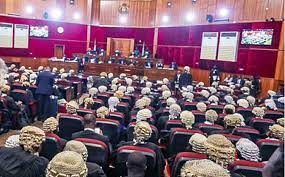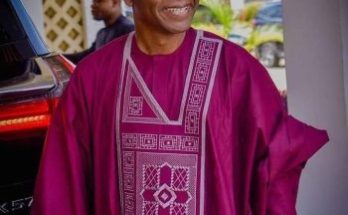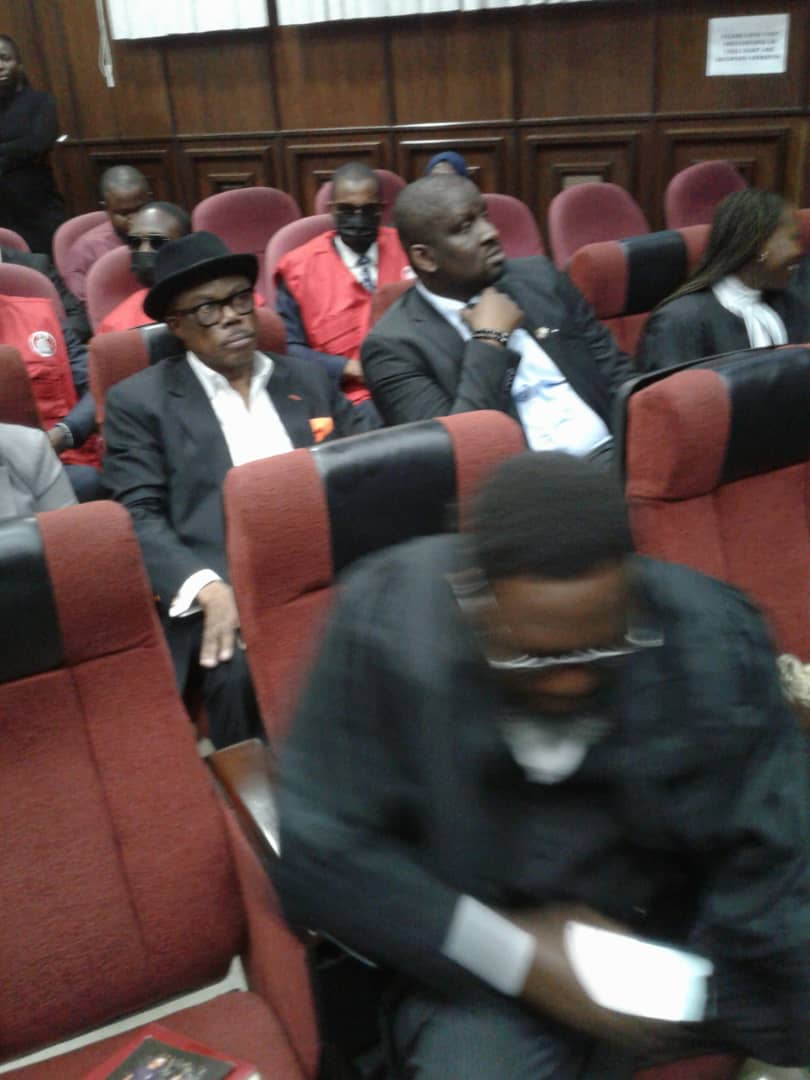The close of arguments last month at the presidential election petition court (PEPT) marked the end of hearing until judgment is delivered. KEHINDE OSASONA reminisces on what transpired and growing anxiety.
Background
Going by statutory provision that election petitions must be heard and determined within 180 days from the day of filing, the presidential election petition court (PEPT) therefore, has until 16 September to deliver its judgment.
A five-member panel of the court presided over by Haruna Tsammani at the last sitting reserved its judgment, declaring that a date for judgment would be communicated to parties in the suit.
Without prejudicing the court and going by the provisions guiding electoral petitions, the final judgment in the 2023 presidential contest between Peter Obi (LP), Abubakar Atiku (PDP) and President Bola Tinubu (APC) is expected to be delivered before the end of September.
On March 20 to be specific, this Blueprint recalled that Obi, the LP presidential candidate, had filed a petition, rejecting the outcome of the election.
What followed his stance was a legal action from the LP, PDP and APM candidates at the Presidential Election Petition Tribunal (PEPT).
The petitions to quash his election started streaming in just a few days after Tinubu was declared winner of the February 25 poll.
In the petition, Obi urged the court to nullify President Tinubu’s victory at the presidential election. While advancing his arguments, Obi alleged that Nigeria’s electoral commission, INEC, failed to “substantially comply with the provisions of the Constitution and the Electoral Act” in its conduct of the polls.
The LP candidate and his counterpart in the PDP argued further that apart from the fact that Tinubu did not score 25 percent of the votes cast in the FCT as required by the constitution, the election they insisted was characterized by irregularities, ranging from rigging to manipulation of election results, intimidation and suppression of voters, destruction of ballot boxes and papers, and thuggery among others, including claims that Tinubu and his running mate, Kashim Shettima, were not qualified to contest the election in the first instance.
Consequent upon arguments occasioned by the legal brawl, parties’ counsels battled one another for about three months and now, argument has closed, and final written address and other submission have also been taken and now the development as to when the final verdict would be delivered has increased growing apprehension in the camps of the LP, PDP and the ruling APC on one hand and the citizenry on the other hand.
While declaring the winner, INEC Chairman, Prof. Mahmood Yakubu it will be recalled announced that Tinubu polled 8,794,726 votes to beat Atiku who polled 6,984,520, and Peter Obi who placed third with 6,101,533.
By that score, INEC stressed further that Tinubu had met the first constitutional requirement of garnering the highest votes among all the candidates. He said he also scored over 25 percent of the votes cast in 30 states, which are more than the 24 states that are constitutionally required.
However, many aggrieved persons and some political parties who faulted the declaration, have argued that INEC had neglected a very important constitutional requirement, which states that a candidate must score 25 percent of the votes cast in the Federal Capital Territory (FCT), Abuja, to be declared president of Nigeria.
Matters arising
Earlier in a 14-page response, Tinubu’s lawyers had argued that Obi and LP “abandoned” their petition in their final written address.
They asked the court to dismiss their arguments over the “clear manifestation and display of abandonment of the entire petition”.
The president’s lawyers insisted that Obi and LP did not address the “purported failure of INEC to supply them Form ECSAS in several polling units” and the allegations of “mutilations, cancellations and outright swapping of votes”.
Tinubu lawyers said: “From this simple grammatical provision of the rules, it is clear that the petitioners have not formulated any issue for determination capable of being considered or countenanced by this honourable court; and the court can also not consider their address without issues for determination being presented by them.
“Throughout their address, this sweeping statement has not been activated by pointing to any specific Form ECSA, which is caught by their alleged vices, or which contains any figure/votes swapped in favour of the 2nd and 4th respondents, against the petitioners; what the figures are, how the said figures have affected their votes, and how the said conjectured figures have aided the votes of the respondents,” the lawyers said.
“With respect, the entire address, like the petition itself, is a fiction.”
In a written address dated July 14, the 2nd and 3rd respondents led by Wole Olanipekun (SAN), faulted the claims of Obi’s witnesses including the seventh witness, Clarita Ogah who had claimed to be a cloud engineer and a member of staff at Amazon.
The respondents also warned the Presidential Election Petition Court (PEPC), that misinterpreting the law as provided for in the constitution on the 25% of lawful votes cast in the Federal Capital Territory (FCT), Abuja, could “lead to absurdity, chaos, anarchy and alteration of the very intention of the legislature.”
However, the petitioners in their final written address filed by Obi’s lead counsel, Livy Uzoukwu (SAN), to the 2nd and 3rd respondents, said there will only be anarchy if the rule of law is truncated.
“This is a cheap, misguided, and destructive blackmail clearly intended to target the country’s judicialism and constitutionalism. It also aims at cannibalising our democracy.
“When has it become offensive for Petitioners to canvas a ground prescribed for the challenge of an election in section 134(1)(b) of the Electoral Act? Desperation taken too far can be extremely dangerous. Let the 2nd and 3rd Respondents (Tinubu and Shettima) know that where the rule of law is trampled upon or truncated, anarchy reigns supreme,” the written address partly read.
More submissions
The presidential election petition court has also reserved judgment in the petition filed by Atiku Abubakar, candidate of the Peoples Democratic Party (PDP).Among several issues raised in the joint petition, Atiku and the PDP are alleging that Tinubu was not qualified to contest the poll.
While closing his case, Atiku made some prayers, which include that Tinubu was not duly elected by a majority of lawful votes cast, and therefore his victory is unlawful, wrongful, unconstitutional, and should be voided.
Atiku prayed that the court declare him the winner as he scored the majority of lawful votes cast at the presidential election among others.
While adopting his final address, Abubakar Mahmoud, counsel to INEC, said the main kernel of the petitioners’ case “is around the non-compliance with the provision of the electoral act”.
He argued: “While I agree that the use of technology is to enhance transparency, evidence adduced by the petitioners themselves shows the good intentions of INEC to conduct a credible, free and fair election to which they sought to deploy credible technology.
“There is no electronic collation system prescribed by the commission. Collation remained manual. They failed woefully to establish that the glitch on IReV was caused by human interference and that it affected the outcome of the election.”
Finally, Mahmoud said the argument that winning 25% of votes in the FCT is a requirement for winning the election “is absurd”.
On the issue of dual citizenship, Lateef Fagbemi, APC counsel, told the court that the constitution provides that a Nigerian citizen by birth cannot be disqualified from contesting in the presidential poll. He however noted that the president holds no other citizenship.
Fagbemi said the issue of dual citizenship has already been settled by various courts as well as the Supreme Court in Oyetola Vs INEC & Others.
Addressing the issue of disqualification on the grounds of indictment on drug trafficking, the senior lawyer said Tinubu never faced a criminal allegation in the United States.
“The forfeiture proceedings do not fit into the prescription of qualification,” he said.
“It is not a disqualifying factor. No evidence of arraignment or pleadings. It was a civil forfeiture proceeding.”
He prayed the court to “throw this petition as far as your hands can carry because it has failed in both its roots and branches”.
The petitioners urged the court to uphold their case.
In the same vein,Tinubu and his party, APC, also told the tribunal that should there be need for a run-off, LP’s Obi should not be part of it.
Their argument is that Obi was not qualified to fly the LP’s flag in the election, by virtue of his name not contained in the membership register submitted to the INEC prior to the polls.
But as Nigerians await the verdict of the tribunal amid anxiety and expectations, discussions and opinions on the possible outcome have continued to unabate.
While a handful of aggrieved persons have expressed fear that democracy is on trial, many are of the opinion that the Nigeria democratic practice is still work in progress.




